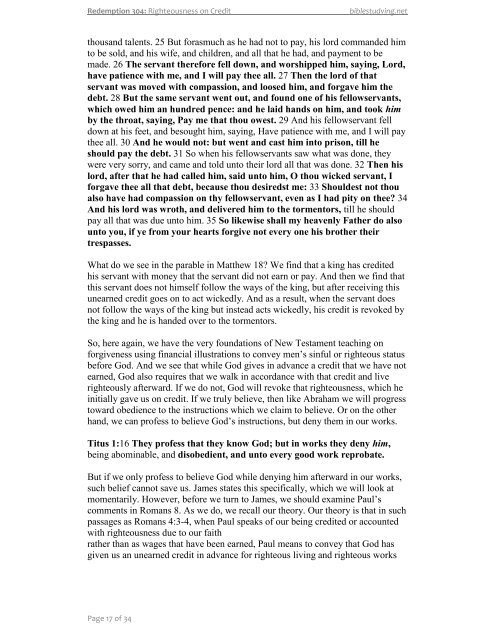righteousness-credit
righteousness-credit
righteousness-credit
Create successful ePaper yourself
Turn your PDF publications into a flip-book with our unique Google optimized e-Paper software.
Redemption 304: Righteousness on Credit<br />
biblestudying.net<br />
thousand talents. 25 But forasmuch as he had not to pay, his lord commanded him<br />
to be sold, and his wife, and children, and all that he had, and payment to be<br />
made. 26 The servant therefore fell down, and worshipped him, saying, Lord,<br />
have patience with me, and I will pay thee all. 27 Then the lord of that<br />
servant was moved with compassion, and loosed him, and forgave him the<br />
debt. 28 But the same servant went out, and found one of his fellowservants,<br />
which owed him an hundred pence: and he laid hands on him, and took him<br />
by the throat, saying, Pay me that thou owest. 29 And his fellowservant fell<br />
down at his feet, and besought him, saying, Have patience with me, and I will pay<br />
thee all. 30 And he would not: but went and cast him into prison, till he<br />
should pay the debt. 31 So when his fellowservants saw what was done, they<br />
were very sorry, and came and told unto their lord all that was done. 32 Then his<br />
lord, after that he had called him, said unto him, O thou wicked servant, I<br />
forgave thee all that debt, because thou desiredst me: 33 Shouldest not thou<br />
also have had compassion on thy fellowservant, even as I had pity on thee? 34<br />
And his lord was wroth, and delivered him to the tormentors, till he should<br />
pay all that was due unto him. 35 So likewise shall my heavenly Father do also<br />
unto you, if ye from your hearts forgive not every one his brother their<br />
trespasses.<br />
What do we see in the parable in Matthew 18? We find that a king has <strong>credit</strong>ed<br />
his servant with money that the servant did not earn or pay. And then we find that<br />
this servant does not himself follow the ways of the king, but after receiving this<br />
unearned <strong>credit</strong> goes on to act wickedly. And as a result, when the servant does<br />
not follow the ways of the king but instead acts wickedly, his <strong>credit</strong> is revoked by<br />
the king and he is handed over to the tormentors.<br />
So, here again, we have the very foundations of New Testament teaching on<br />
forgiveness using financial illustrations to convey men’s sinful or righteous status<br />
before God. And we see that while God gives in advance a <strong>credit</strong> that we have not<br />
earned, God also requires that we walk in accordance with that <strong>credit</strong> and live<br />
righteously afterward. If we do not, God will revoke that <strong>righteousness</strong>, which he<br />
initially gave us on <strong>credit</strong>. If we truly believe, then like Abraham we will progress<br />
toward obedience to the instructions which we claim to believe. Or on the other<br />
hand, we can profess to believe God’s instructions, but deny them in our works.<br />
Titus 1:16 They profess that they know God; but in works they deny him,<br />
being abominable, and disobedient, and unto every good work reprobate.<br />
But if we only profess to believe God while denying him afterward in our works,<br />
such belief cannot save us. James states this specifically, which we will look at<br />
momentarily. However, before we turn to James, we should examine Paul’s<br />
comments in Romans 8. As we do, we recall our theory. Our theory is that in such<br />
passages as Romans 4:3-4, when Paul speaks of our being <strong>credit</strong>ed or accounted<br />
with <strong>righteousness</strong> due to our faith<br />
rather than as wages that have been earned, Paul means to convey that God has<br />
given us an unearned <strong>credit</strong> in advance for righteous living and righteous works<br />
Page 17 of 34


